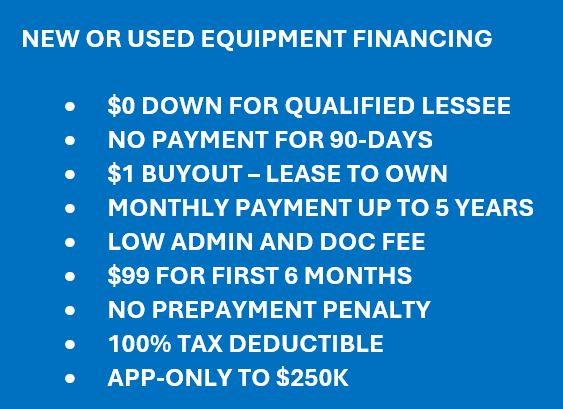Equipment Financing for Startups: What You Need to Know
Starting a new business is an exciting venture, but securing the necessary equipment can be a challenge. Equipment leasing and financing offer viable solutions for startups to acquire essential tools without the substantial upfront costs of outright purchases. By spreading the cost over time, you can preserve cash flow and invest in other areas of your business.
What’s the Credit Parameters and Requirements for Startups
Well, let’s break it down by type of loan first. Each loan types whether Secured Loans or Unsecured Loans will have varying parameters. Understanding the credit parameters and financial requirements for each loan type will allow you to narrow down based on the needs as well.
It’s crucial for startups seeking equipment financing to utilized equipment financing rather than using cash on hand or line of credit or business loan that can be use for such business operating capital as payroll, marketing, and inventory.
What Every Startup Owner Needs to Know About Equipment Financing.
- Down Payment: For startups, there is no such thing as a $0 down payment. You must have “skin in the game.” This typically means providing a down payment, which can be higher for those with lower credit scores.
- Security Deposit: Lenders often require a security deposit to mitigate their risk, especially for startups with sub-prime credit.
- First and Last Month’s Payment: Be prepared to pay the first and last month’s lease payments upfront.
- Line of Credit for Startups: Hard to come by. If they do, will not offer huge amount.
- Administrative Fees: An admin fee may also be required to cover the costs of processing your lease application.
- Balloon Payment or Buyouts: There will be lenders who will be willing to fund startups for equipment but sometimes they will only offer FMV, TRUE LEASE or CAPITAL LEASE with a buyout like dollar buyout.
Credit Considerations for Startups
The creditworthiness of your startup plays a significant role in the terms of your equipment financing. Here are key points to consider:
- Credit Score: Credit is all relative. Our focus is to get you approved. Like any form of funding, there’s always that “it depends” thing. If your credit is sub-prime, expect to make a larger down payment, provide additional collateral, or offer a higher security deposit. Plus your industry, equipment type and location will be an additional risk factor.
- Credit Limits: Lenders limit the amount they are willing to lend to startups depending on the credit, industry, equipment etc… Depending on your credit score, financing amounts can range from $5,000 to $150,000, with some lenders going up to $75,000 for those with decent credit.
However, many lenders will not put a huge exposure to startups, they will limit but if equipment is all independent, Liberty Capital will break it up into multiple leases to meet each lender’s maximum risk, all acceptable. The fact that startups are risky, you have to know the right partner that knows what approvable and non-approval type of loan is a startup need.
Industry and Equipment Type Matters for Startups
The type of industry and equipment also impacts the approval process and terms:
- Riskier Industries: Startups in industries like long-haul trucking are seen as higher risk compared to more stable fields such as plumbing, or dental office.
- Specialized Equipment: The type of equipment matters. A Dental Office seeking an X-Ray Machine might find it easier to secure financing than a startup restaurant looking to refurbish a whole kitchen with used equipment.
- Collateral: In some cases, the equipment itself can serve as collateral, but additional collateral might be required based on the risk assessment to provide additional security for the lender due to risk especially for bigger ticket items start ups.
- Time in Business: Start up is all relative. Uber is still considered start up? There’s pre-revenue start up and post revenue start up. Which do you think can have easier access to financing? The one with revenue. Banks consider restaurant start up up to 5 years for some banks. Trucking company must be 2 years to not be considered start up.


